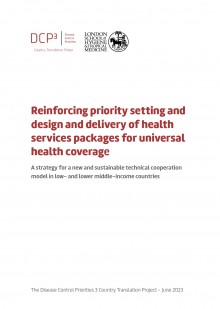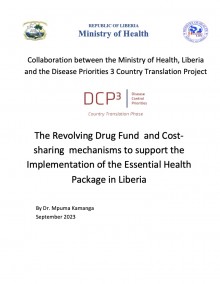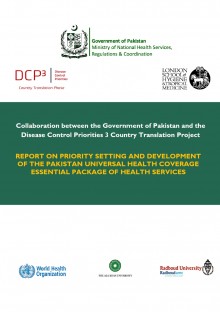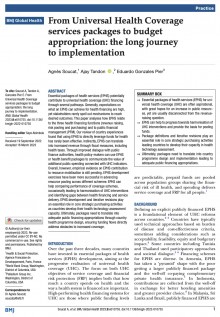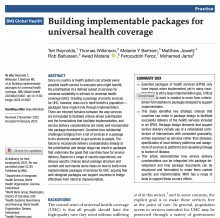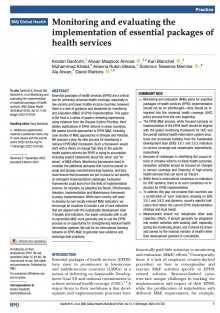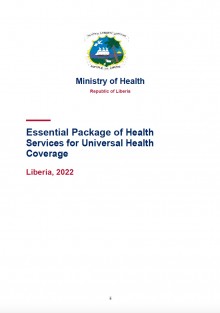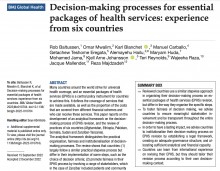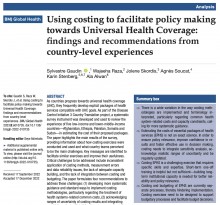DCP3 Country Translation Project
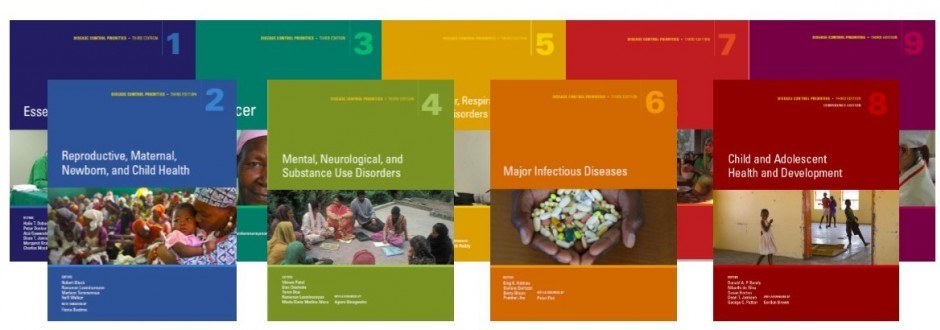
Achievements in Pakistan
Pakistan is the first country in the world to align its UHC Benefit Package with the DCP3 recommended high impact interventions. Read more about the process of developing and implementing a national Essential Package of Health Services and other achievements in Pakistan here.
DCP3 Country Translation Project
The Disease Control Priorities 3 (DCP3) Country Translation project is a multi-year initiative designed to respond to the increasing needs of low and lower-middle-income countries (LLMICs) for technical guidance and support in priority setting and the development of universal health coverage (UHC) essential packages of health services (EPHS). It works with countries to build local capacity in the areas of priority setting and evidence-based decision making on resource allocation and supports the development of EPHS that espouse key principles of UHC and are implementable within the available government resource envelope.
In 2018, with the support of the Bill & Melinda Gates Foundation, the DCP3 Country Translation Secretariat at the London School of Hygiene & Tropical Medicine used the evidence and model UHC packages developed through DCP3 to further achieve the following objectives:
- Increase the use of the DCP3 evidence and resources in LLMICs through piloting in selected countries to develop UHC EPHS;
- Improve the global evidence and resources to support best practices in priority setting and development and implementation of UHC EPHS;
- Strengthen the capacity of national decision makers and institutions in LLMICs to conduct priority setting and develop and sustain UHC EPHS;
- Develop a fast-track sub-package of highest priority basic health services for use in polio high-risk areas.
The strategic goal of this project is to enable decision makers in LMICs in allocating often tightly constrained budgets so that health system objectives are maximally achieved, in the pursuit of UHC. It also presents a conceptual model and a strategic approach for UHC that covers its three dimensions (i.e., expanding population coverage, increasing the range of essential services, and reducing financial risk). By publicly financing the highest-impact health interventions, the resulting range of essential services can be made accessible to all, and financial risk will be reduced.
Achieving the ambitious goal of UHC by 2030 requires greater investments in expanding population coverage, providing access to high-quality health services and protecting against financial risk. Shortfalls in access, quality, efficiency, and equity in health care have been documented extensively throughout the world, and DCP3 is helping low- and middle-income countries accelerate progress towards UHC by providing them with guidance on priority health interventions for UHC in the form of a set of model UHC Packages.
The packages include an Essential UHC Package (EUHC), a high priority package (HPP), and an intersectoral package, which could be adapted to reflect country-specific needs, health system capacities, financing structures, available resources and other local circumstances.
The Essential UHC Package (EUHC) has 218 health interventions and is designed for lower-middle income countries. Assuming steady-state implementation by 2030, EUHC has the potential to reduce premature deaths by an estimated 4.2 million per year in lower-middle-income countries.
The highest-priority package (HPP) is composed of 108 interventions and is designed for countries in which the fiscal space for health does not allow the implementation of the full EUHC package.
The package of intersectoral policies consists of 71 interventions to be implemented in partnership with sectors other than health. Out of 71 policies, 29 are core priorities for early implementation. These intersectoral policies that promote or protect health and when implemented as part of a coherent plan, can constitute a whole-of-government approach to health. The package covers fiscal policies, regulatory policies, built infrastructure interventions, and health promotion and information interventions.
The DCP3 findings in its 9 volumes and the UHC packages support countries in their efforts to achieve full access to essential health care. DCP3 packages can be adapted to reflect local disease burden, health care needs, national financing structures and local evidence on costs.
The DCP3-UHC Country Translation work focuses primarily on four areas:
-
Increasing the use of DCP3 evidence and resources in LMICs
DCP3 is providing comprehensive technical support to two pilot countries in priority setting and development of UHC essential packages of health services EPHS). In the first pilot country, Pakistan, the Ministry of National Health Services Regulations and Coordination (MNHSR&C) and the DCP3 Secretariat developed a national EPHS, and work is underway to begin a phased implementation of the EPHS at the district level. In the second country, Liberia, DCP3 collaborated with the Ministry of Health and development partners in designing an evidence-based UHC essential package of health services.
-
Improving the global evidence and resources to support best practices in priority setting
DCP3 is providing technical guidance to LLMICs in priority setting for UHC and developing or revising EPHS. This work brings together a broad range of partners, including the WHO, the World Bank, USAID, and others. Drawing on the experience and lessons learned from Pakistan and other countries that used DCP3 evidence in setting up their packages, the DCP3 Country Translation Secretariat is working with a network of professionals to develop a set of publications which will serve as a guidance for other low- and lower-middle-income countries in developing feasible and implementable UHC EPHS. -
Strengthening the capacity of national decision makers and institutions
DCP3 is strengthening the capacity of national decision makers and institutions in Pakistan and Liberia to conduct priority setting and develop and sustain essential packages of health services. This is an essential component of the project, as ensuring capacity within pilot countries is integral to the sustainability of the EPHS.
-
Developing a fast-tack polio sub-package
DCP3 developed a sub-package of highest priority basic health services for polio high-risk areas in Pakistan, where lack of such services is driving community resistance to vaccination and is impeding the global eradication of polio. The sub-package is responding to the immediate health needs of the communities in these high-risk polio areas.
What has been achieved?
The DCP3 Country Translation project has successfully delivered on several key aspects of the project. The project has been piloted in Pakistan, where the Ministry of National Health Services, Regulations and Coordination (MNHSR&C) in collaboration with the DCP3 Secretariat and other partners developed an Essential Package of Health Services containing 117 health interventions, out of which 88 interventions are for immediate implementation. Four provincial packages were also developed through a process similar to the design of the federal package. The implementation of the package will follow a phased approach, with implementation starting in 12 districts before being scaled up to 40 districts.
The project has also completed work on objective four, which included the development of a fast-track sub-package of highest priority basic health services in high-risk polio areas. The sub-package includes both high priority health and basic water, sanitation, and hygiene services and has been implemented in 40 high risk polio-endemic councils in Pakistan.
In Liberia, the Ministry of Health and DCP3 worked with partners to update the existing EPHS through evidence-informed processes, using the DCP3 evidence and model UHC packages. The work included evidence collection, fiscal space analysis, mapping of existing services, training on resource optimisation analyses to inform health intervention prioritisation, setting decision criteria for the prioritisation of interventions, conducting a prioritisation workshop, and developing and discussing funding scenarios. A UHC package of health services, focused on primary health care, is being adopted for implementation.
In both countries, the project has also strengthened the capacity and skills of staff in the Ministry of Health and other national partners, in public health leadership, priority setting, policy decision making, and in designing the national health benefits package. This has been achieved through training, technical meetings and working group sessions, regular consultations and advice from DCP3 staff, and hands-on practice.
What we will be doing next?
DCP3 will continue providing comprehensive technical support to MoH and relevant local partners to ensure sustainability of the process and implementation of the UHC Essential Packages of Health Services. A strategy is also being developed to reinforce technical support to low and middle-income countries in priority setting and in the development and implementation of affordable UHC packages of health services.


